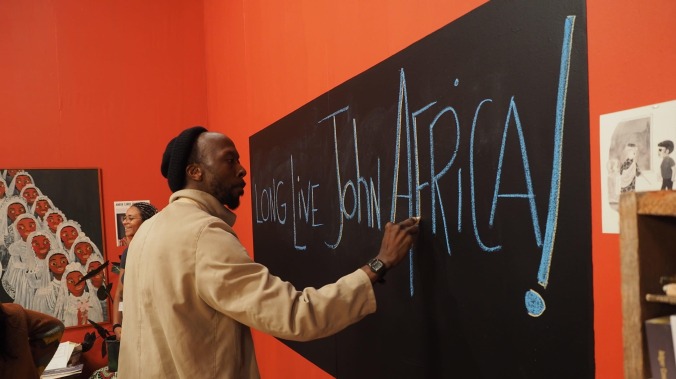Asili never tries to disguise the set’s inherent theatricality. Rather, he imbues it with an indelible sense of tactility simply by filling it with personal significance. Every object, many of them clearly worn by use, feels hand chosen; every shade of color feels handpicked; every piece of furniture or fabric feels specific to that room. Asili’s controlled design doesn’t render The Inheritance sterile. Instead, it swells with free-wheeling creativity and Black pride.
The Inheritance doesn’t so much feature a plot as it charts an ensemble, tracing different relationships and personalities that make up a makeshift community. Julian (Eric Lockley) inherits the house from his grandmother, and he and his partner, Gwen (Nozipho Mclean), transform it into a communal space named The House Of Ubuntu. Julian’s childhood friend Rich (Chris Jarell) schmoozes his way into the house, but his uncouth, laidback attitude makes him a permanent interloper in the eyes of the group. Stephanie (Aniya Picou) works in a café near Temple University, where she deals with casual condescension from the student population. Jamel (Timothy Trumpet Jr.) carries his trumpet everywhere like Linus with his security blanket and performs in a two-person band with drummer Old Head (Julian Rozzell Jr.). The group operates “through the principle of consensus,” and much of The Inheritance’s gentle comedy stems from the inherent difficulties of maintaining harmony while living by agreed-upon codes. The infighting often elevates relatively trivial disputes in a way that will be familiar to anyone who has been around activist communities, as when a house meeting struggles to get off the ground because many forget to follow a “no shoes inside” rule.
Asili, whose previous work includes a series of short films about the African diaspora, combines scripted scenes of the group with other artistic modes, such as the actors reading excerpts from Black thinkers directly into camera or giving brief in-character interviews about their thoughts on collective living. The Inheritance also centers nonfictional elements, including lengthy sequences featuring archival footage of MOVE, a Black separatist organization whose radical-cum-environmental ideology so threatened the state that it led to two deadly actions from the Philadelphia police: a shootout in 1978 and a bombing of a residential property in 1985. In one section, three original MOVE members discuss the organization’s commitments to “natural laws” and the oppressive actions that led to their 100-year prison sentences, from which they were only recently paroled. Asili doesn’t treat the fiction and nonfiction pieces of The Inheritance as separate units that need to be hybridized. In fact, his most Godardian impulse is to assert that they exist on the same artistic continuum. He juxtaposes them like they’re one and the same, canopied under a painfully overlooked side of history and integrated into an inclusive framework.
While The Inheritance draws creative connections between history and art, comedy and philosophy, politics and performance, Asili never stresses a specific takeaway. His goal is immersion, to try to bring the audience into a world driven by a Black philosophical and artistic canon, and to dismantle the perception that it’s “alternative” to anything. The film expresses a tremendous respect for autonomous lifestyles that organically arise when a prejudicial, capitalistic society fails to safeguard its most vulnerable citizens. The ensemble in The Inheritance operates in opposition to traditional mores, but they adopt grounded tenets: shared labor, healthy living, mutual respect, and the preservation of their local community, all values that only seem peculiar when contrasted with America’s hyper-individualist social structure. Asili wants to use The Inheritance to stimulate curiosity without preaching, to educate without lecturing, and he succeeds more often than he falters.
The film suffers from some unsurprising weaknesses, like inconsistent performances from the mostly green cast and certain scenes whose ideas aren’t quite strong enough to justify their length. But they’re forgivable in the face of Asili’s larger motivation, which is to center historically marginalized people in an entirely unsentimental light. His 16mm photography lends an intimacy to both the interior scenes and the exterior shots of West Philadelphia, non-didactically linking his dramaturgical space with the real world, further epitomized by scenes featuring spoken-word performances from local writers and artists Sonia Sanchez and Ursula Rucker. The Inheritance eventually takes on another metaphorical meaning: It’s about the beliefs we pass down, via words and actions, in the continuing fight against systematic oppression.


 Keep scrolling for more great stories.
Keep scrolling for more great stories.
